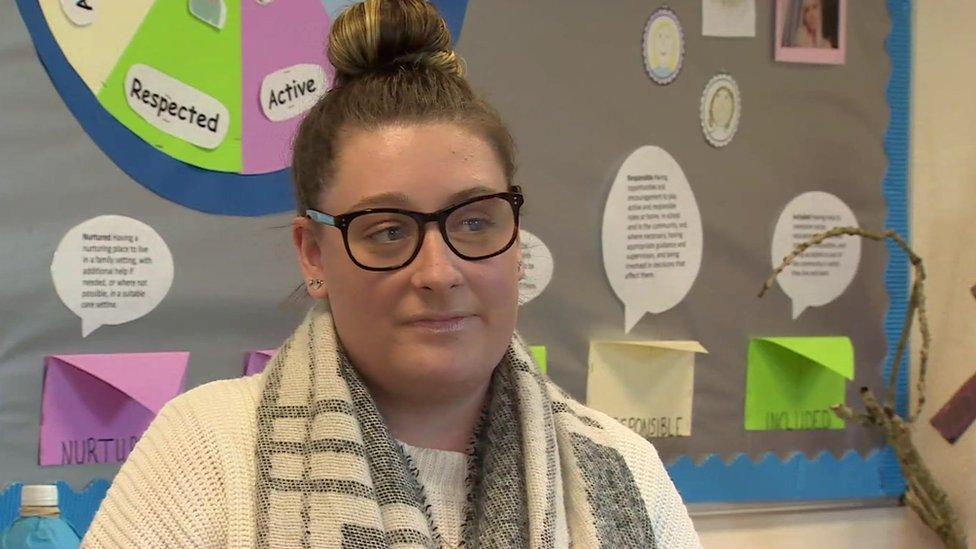Covid: Support calls for graduates in 'midst of pandemic'
- Published

Graduates like Tim Dodd are facing an uncertain future
Support is needed to stop students being "left out in the cold" after graduating during the coronavirus pandemic, a union has said.
BBC Wales has spoken to graduates who have applied for as many as 80 jobs - often without even a reply.
The National Union of Students now fears many graduates are struggling both financially and mentally as they try to find employment.
The Welsh Government said it had provided £10m to support students.
Graduating from university should have been a proud moment for thousands of students.
Instead it become a lonely process as campuses emptied, work-placements were cancelled and graduation ceremonies scrapped amid lockdown.

Becky Ricketts said more help is needed to prepare students for post-graduate life
NUS Cymru President Beck Ricketts said many students were dealing with isolation after learning was switched online.
"Students are effectively on their own with a degree, and trying to get a job in a very different climate than the one they entered university in," she said.
Ms Ricketts said many students were feeling anxious about finding work, and changes were needed to prepare final year students for post-university life.
"With all the difficulties around isolation, and the uncertainty about what's to come in 2021, it is going to have a detrimental effect on students' mental health," she said.
Apprentices miss out as pandemic cuts work
A survey by Prospects, external, in May, found many final-year students had seen job offers deferred or even withdrawn due to the economic disruption caused by Covid.
Of the 1,202 students who responded and due to graduate, 64.6% had said they felt negative about their job prospects.
Economists estimate the graduate job market has faired better than the wider market, external, and many employers and universities had adapted.
And with pubs and non-essential shops struggling, even casual work has dried up.


Tim had to wait until his course officially ended before he could apply for Universal Credit
After completing a master's degree in September, Tim Dodd hoped to start his dream job as a broadcast journalist.
But instead, after seeing work-placements cancelled, he is now looking at different opportunities.
"For about two months I was applying for jobs," said the 23-year-old, who has moved in with his parents in Pontypridd.
"I was emailing everyone under the sun. I now realise that after applying for about 80 jobs, and either being rejected or not hearing back, it's not worth my time spending all week applying.
"I've been looking at what I can do instead. It's not as simple as going back to retail jobs I'd done in the past. I didn't get anything back from WH Smiths when I applied a few weeks ago."
With many media organisations making cuts, Mr Dodd said he was aware he was up against people with years of experience when applying for roles.
"There's so may people out of work with more experience that it's not fair to shortlist a graduate," he said.
"You're a bit stuck, I can't do the dream job but I also can't do much else."


Megan Haf Williams is hoping to retrain as a personal trainer after graduating with a degree in interior design
Interior Design graduate Megan Haf Williams, 23, faces a similar dilemma after the "massive anti-climax" of finishing her Cardiff course.
She had been unable to showcase her work at the usual end-of-year exhibition.
"It's quite daunting knowing when you're applying there are people who are way more qualified, it's demotivating," she said.
"If everyone is at home, to train someone is probably really difficult. It means we're not very hireable at the moment."
Megan, who also had her work cut at a local pub, is now hoping to retrain as a personal trainer.
"I am beginning to feel more hopeful that once restrictions start easing, more jobs come on the websites. But once there are rumours of another [lockdown], they all vanish again," she said.

While there has been a 12% fall in graduate recruitment this year, the Institute of Student Employers believes there are reasons for students to be optimistic.
Graduate labour market expert Charlie Ball said many major firms were still honouring graduate schemes.
But he said those graduating in the arts, creative and hospitality sectors had been hit hard.
"It's not necessarily jobs being lost, but a lot of employers have hunkered down because they know there's light at the end of the tunnel," he said.
The Welsh Government said it had provided an extra £10m to support students at Welsh universities, including additional mental health support.
"This is in addition to £27m to support universities this year, as well as £1.5m to support students who have graduated this year to begin their careers," a spokesman said.
- Published30 November 2020

- Published27 November 2020

- Published8 December 2020
